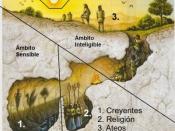#
Background
A problem for the Socratic search for definitions: how do you know when a definition is correct? You have to (at least) understand the definition, i.e., you have to understand the terms in the definiens. But how do you do that? By understanding their definitions? This leads to either circularity or an infinite regress.
The problem arises if we try to give a linguistic account of understanding. The knowledge of a definition according to such an account would have to be propositional knowledge. That is: we explain what X is by offering the definition
X =df ABC.
This just invites the question: how do we know that X is ABC? If we answer this by saying that we know what A, B, and C are, and if we have to explain our understanding of A, B, and C in a similar way, there is no way out.
Plato's idea: at some point, one must invoke a kind of knowing that is not propositional - i.e.,
not a matter of knowing that something-or-other - but is more like knowledge by acquaintance. More graphically: one must invoke a kind of knowing that is not a matter of grasping a definition of one term by means of other terms, but of grasping the thing itself.
This is the way recollection seems to be understood in the Phaedo. Recollection is the epistemological mechanism, and the Forms are the objects to which the mechanism is applied.
[Plato may be right in rejecting the idea that understanding can be adequately explained in terms of knowing that, but wrong in proposing a kind of knowledge by acquaintance in its place. The proper contrast is not between knowledge by description (knowing that p) and knowledge by acquaintance (knowing x), but between knowing that...
![Socrates. : A translation of the Apology, Crito, and parts of the Phaedo of Plato. [Front cover]](https://s.writework.com/uploads/2/29372/socrates-translation-apology-crito-and-parts-phaedo-plato-fr-thumb.jpg)

